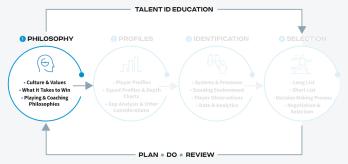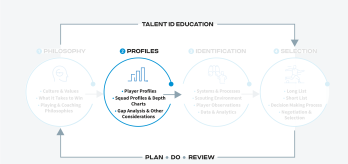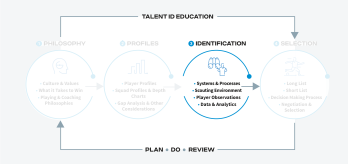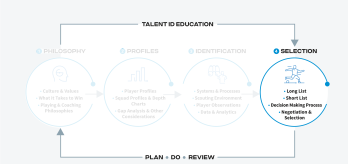Talent identification has a critical role to play in establishing a successful football programme. A pivotal function, it intertwines seamlessly and creates a foundational base to enable other areas, such as talent development and national teams, to excel. Despite the significance of talent identification, the global ecosystem analysis report published by FIFA in May 2021 revealed that a substantial number of football organisations lacked a dedicated talent identification strategy.
The four-step talent identification dimensions model, previously presented by FIFA High-Performance Specialist Richard Allen, serves as an adaptable framework designed specifically to help organisations to identify the best football talent. Each step within this guide serves a distinct purpose, coming together to enhance the effectiveness of the overall talent identification process. The first step, which entails linking a football organisation’s talent identification strategy to an overall philosophy, is essential to ensuring alignment and coherence within a football organisation’s ecosystem.
Why is this dimension important?
Philosophy refers to the core beliefs, values and principles that guide an organisation’s overall approach and decision-making process. In the football context, an organisation’s philosophy describes its beliefs, culture and values (i.e. its identity), and more broadly, what the organisation is all about and what it stands for. It includes an understanding of what it takes to win (winning strategies, performance support and planning), now and in the future (future game, future player).
An organisation’s football philosophy significantly influences its talent identification strategy. Philosophy is the foundation on which strategies are built and executed. In fact, an organisation’s football philosophy may shape the criteria used to evaluate players and the desired style of play. Ultimately, a football philosophy guides the identification of talent, which is aligned with strategic objectives and playing style, ensuring efficiency and alignment throughout the football organisation.
To successfully create or develop a football philosophy, adequate time needs to be spent engaging with all relevant internal and external stakeholders to ensure buy-in, understanding and support. Having a football philosophy that is aligned with the wider objectives of a football organisation’s ecosystem is essential to achieving a unified talent identification process.
How do you achieve success?
Understand and incorporate culture and values
The focus of culture and values is on understanding and comprehending the context within a functioning football organisation to help shape a football philosophy. A holistic examination of culture and values provides a comprehensive picture of the football organisation’s essence, thereby facilitating the development of a philosophy.
-
What is the football organisation all about and what does it stand for?
-
What is the football organisation’s community culture?
-
What is its football culture?
-
Outline and ensure alignment with the organisation’s identity, community culture and football culture.
-
Create a focus group and use stakeholder engagement to codevelop an understanding of the football organisation’s culture and values.
-
Japan’s Way: Within this presentation you can find out how the Japan football association uses their unique culture and history to develop an overarching national football philosophy.
-
The Welsh Way: Within this article you can find out more about how the core values of Wales have been integrated into their football philosophy and how this philosophy has been used to create alignment in football across the country.
-
Talent identification in Finland: Within this presentation you can find an explanation on how Finland’s culture and values, centred around equality, has influenced their talent identification philosophy and subsequent approach, to give every talent a chance.
Recognise what it takes to win
The focus of what it takes to win involves gaining insights into the football organisation’s resources, objectives and strategies to achieve success now and in the future. Understanding what is takes to win in a football organisation is integral to developing a philosophy because it shapes and aligns the overarching goals, values and strategies.
-
What winning strategies, education and training are in place?
-
What performance support is in place?
-
What are the likely scenarios across various timescales (the short and the long term)?
-
How does the resources, objectives and strategies to achieve success align with your national and football culture?
-
How is the football organisation’s approach research-informed?
-
How do you benchmark each player?
-
What do you want to achieve in the immediate, the short term and the long term?
-
Consider winning strategies as well as education and training for key partners.
-
Consider this from a multidisciplinary perspective (e.g. performance support) as well as ensuring that it is research-informed.
-
Plan across various timescales (e.g. the immediate, the short and the long term).
-
Consult at all levels of the game to ensure alignment and buy-in.
-
MODULE 1 | SMART GOALS: This resource includes a goal-setting framework that can help you increase the clarity, focus and effectiveness of your football organisation’s objectives.
-
MODULE 1 | GOAL TREE: This template allows you to break down the goals of your organisation into clear, tangible steps.
Consider playing and coaching philosophies
The focus of playing and coaching philosophies lies on understanding the game from the football organisation’s perspective to optimise the creation of a bespoke philosophy. A clear understanding of playing and coaching philosophies ensures a relevant and bespoke philosophy for a football organisation with a view to optimising the talent identification process.
-
How do you want to play?
-
How do you want to coach?
-
What does the future game look like (in the short and medium term to protect the long term)?
-
What is the game going to look like, and how will this impact on the football organisation’s talent identification processes?
-
What does talent identification mean to the football organisation?
-
Create a clear methodology for both playing and coaching philosophies.
-
Consider the future game and how it could impact player and organisational identity, in order to ensure that the long-term future is protected and the system is adaptable.
-
Emphasise how, ideally, the talent identification strategy should be closely linked to the organisation’s playing philosophy and seek to identify players who have the potential to meet the performance criteria outlined in the organisation’s playing philosophy and games programmes.
-
Encourage cultural conversations and the creation of appropriate working groups where required.
-
David Gordo on Spain’s playing style: In this interview, you can hear Spain’s U-17 national team coach explain the nation’s unique playing style and how it’s coached across all age groups.
Reflection checklist
The following reflections checklist will enable a football organisation to critically evaluate important components of linking a talent identification strategy to an overall football philosophy:
Summary
-
To successfully create or develop a talent identification philosophy, adequate time needs to be spent engaging with all relevant internal and external stakeholders to ensure buy-in, understanding and support.
-
Asking the key questions highlighted in each subdimension aids the development of a holistic, bespoke talent identification philosophy.
-
Considering the various factors that relate to how you can achieve success within each subdimension ensures the rigorous development of a philosophy in the context of talent identification.
-
Use the various practical examples, tools and additional resources embedded within this guide to help shape your own football philosophy.


















.variant64x64.png)
.variant348x164.png)